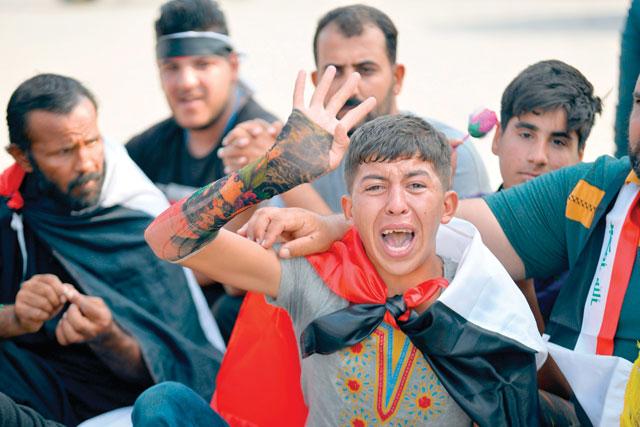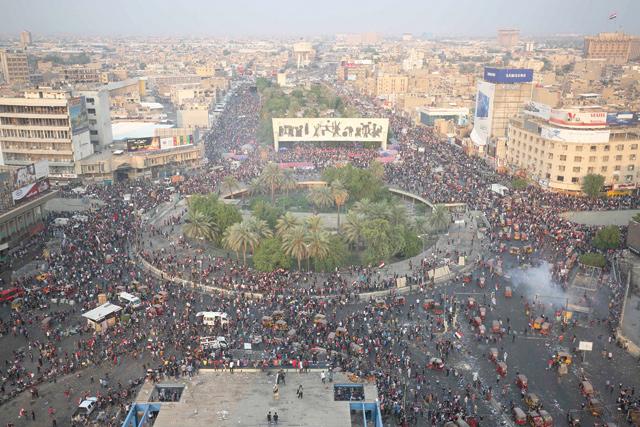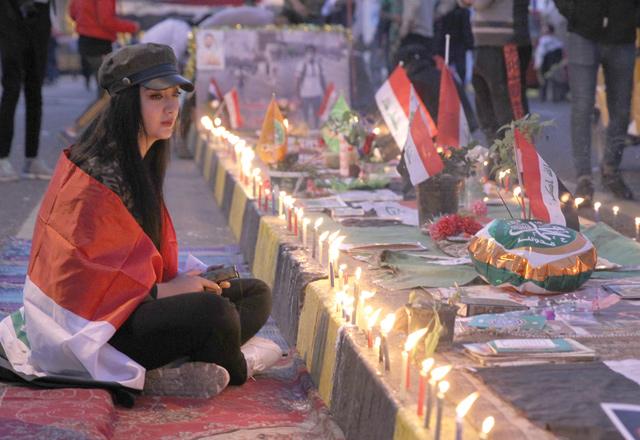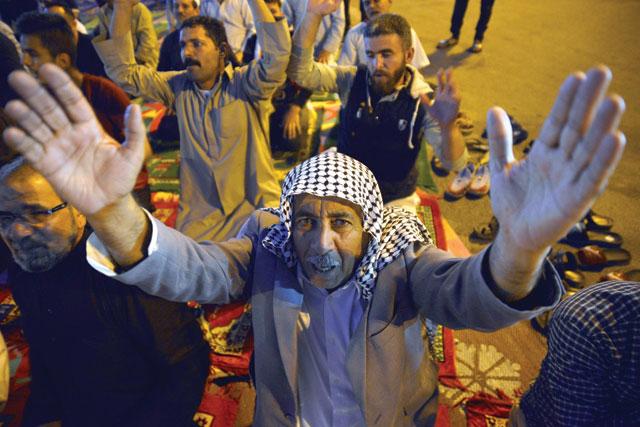You are here
Iraqi students join protests as pressure on gov't swells
By AFP - Oct 27,2019 - Last updated at Oct 27,2019

An Iraqi teeanager, who apparently lost four friends in recent protests, cries as he joins the latest anti-government demonstration outside the Najaf governorate headquarters in the central shrine city on Sunday (AFP photo)
BAGHDAD — Iraqi students joined anti-government protests in Baghdad on Sunday, ramping up the street pressure on Prime Minister Adel Abdel Mahdi who also faced a sit-in from parliament's largest bloc.
The capital and country's south have been rocked by a second wave of demonstrations since Thursday, with protesters digging in despite tear gas, curfews and violence that has left more than 60 dead.
On Sunday morning, students could be seen joining demonstrations in the capital, with activists saying about a dozen schools and universities had decided to shut their doors and take part in protests en masse.
In the emblematic Tahrir Square, young girls in school uniforms with rucksacks were seen trekking through streets littered with tear gas canisters.
Hundreds of protesters had hunkered down in the square, defying heavy tear gas use overnight and pledging to "weed out" the political class.
"We're here to bring down the whole government — to weed them all out!" one protester said, the Iraqi tricolour wrapped around his head.
The protests are unprecedented in recent Iraqi history for their ire at the entire political class, including Abdel Mahdi, parliament speaker Mohammed Al Halbussi and even traditionally revered religious leaders.
They have also been exceptionally violent, with 157 dead in the first set of rallies and 63 dead in the latest round.
"We don't want a single one of them. Not Halbussi, not Abdel Mahdi. We want to bring down the regime," the protester said.
Women were also seen in larger numbers, including a young nurse who said she was protesting "for the generation that's coming".
“Our generation is psychologically tired, but it’s alright as long as this is for the next one,” she said.
Curfews, arrests
Renewed protests also flooded the streets of Najaf, Hilla, Karbala and Diwaniyah in the south.
In the oil-rich port city of Basra, police enforced a strict curfew and said it arrested “saboteurs” who had infiltrated the protesters.
This week’s demonstrations are the sequel to six days of anti-government rallies that erupted October 1.
Sparked by outrage at corruption, unemployment and poor services, they evolved into demands for an overhaul of the political system and a new constitution.
On Saturday, Iraqi President Barham Saleh met with the United Nations’ top representative in the country Jeanine Hennis-Plasschaert to discuss electoral reform and amendments to the constitution, which dates back to 2005.
Abdel Mahdi has also proposed a laundry list of reforms including hiring drives, increased pensions and promises to root out corruption.
Oil-rich Iraq is the OPEC oil cartel’s second biggest producer, but one in five people live in poverty and youth unemployment stands at 25 per cent, according to the World Bank.
Beyond the street, Abdel Mahdi also faces new pressure from parliament, whose largest bloc has been holding an open-ended sit-in since Saturday night to back the rallies.
“The sit-in is ongoing and open until protester demands are met and the reforms promised by the PM are enacted,” said MP Salam Al Hadi, a member of Saeroon — an alliance between populist cleric Moqtada Al Sadr and Iraq’s Communist Party.
The move has left Abdel Mahdi more squeezed than ever, as Saeroon was one of the two main sponsors of his government.
Elite troops deploy
The other was Fatah, the political arm of the Hashed Al Shaabi paramilitary force which said it would continue to back the central government.
The one-time allies now find themselves on opposite sides of the protest movement.
The Hashed was founded in 2014 to fight the Daesh terror group but its factions have since been ordered to incorporate into state security services.
Several of their offices have been torched in recent days in southern Iraqi cities, hinting at a new violent phase.
Dozens of protesters have died while storming or setting fire to the offices of Asaib Ahl Al Haq, the Badr Organisation and others, according to medics and police.
Hashed commanders have threatened revenge, and its second-in-command Abu Mahdi Al Muhandis said Sunday his force “is ready to stand against discord”.
The UN has warned “armed spoilers” could derail efforts at peaceful protests in Iraq, saying it was “tragic” to see renewed violence in the country.
A government probe found “excessive force” was used to quell the first week of protests and in a noticeable change, there have been no reports of live ammunition in Baghdad in recent days.
Most of those killed since Thursday have been shot in the Shiite-majority south, but medics and protesters in the capital have reported trauma wounds from tear gas canisters.
On Sunday, security forces were positioned on the edges of Tahrir, while elite Counterterrorism Service troops and armoured vehicles were seen in surrounding districts.
The CTS said it had deployed its units to “protect vital infrastructure”, and its forces were not seen in Tahrir.
Related Articles
BAGHDAD — The Iraqi army on Monday announced it would impose an overnight curfew in the capital as students and schoolchildren joined spread
BAGHDAD — Four protesters were killed and dozens wounded in overnight clashes with security forces in Iraq's capital Baghdad, security and m
BAGHDAD — Iraqi anti-government protesters clashed with security forces and kept up their sit-ins Sunday, as a rights group warned a deadly



















